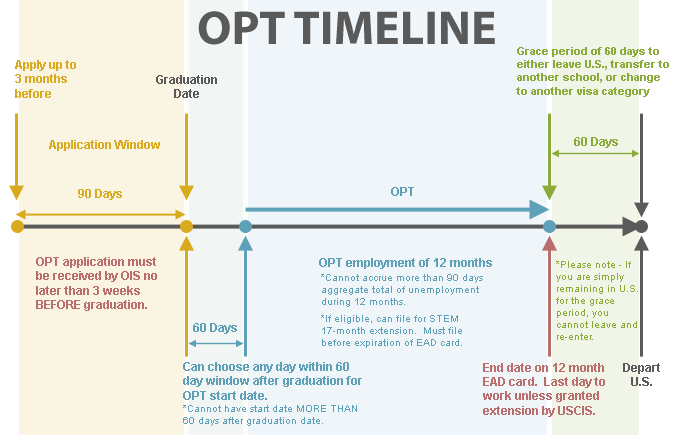In addition to weighing career options after graduation and searching for potential job matches, F-1 international students also have to make another important decision: either go back to their home country, or stay and work here in the US. F-1 international student visas expire after completing your studies and earning your degree, so if international students do decide to stay and work in the US, the deadline of their legal stay puts additional pressure in making career decisions. However, there is a third option that most people overlook, and that is the optional practical training (OPT) period.
What is OPT?
[caption id="attachment_473" align="alignnone" width="687"] http://sait.usc.edu/ois/Upload/OPTWorkshop/Images/timeline.gif[/caption]
http://sait.usc.edu/ois/Upload/OPTWorkshop/Images/timeline.gif[/caption]
Optional practical training is a 12-month opportunity given to international students to gain work experience that is directly related to their field of study, and involves either part-time or full-time work (either paid or unpaid) of at least 20 hours/week. You can be employed either by (1) a single employer for the whole of your OPT period, or (2) multiple employers for short term appointments (must not exceed 12 months), or (3) self-employment in a legitimate limited liability company (LLC). One of the most important things to remember about doing an OPT is that you are still considered under F-1 status, and therefore must report and abide by the rules of your university’s international students office.
Is it beneficial to the job hunting process?
YES. The OPT, as it is defined, is a great opportunity to get relevant work experience! As an example, if I decide to pursue scientific writing as a career and feel that I need more experience in various types of writing, I can apply for an OPT to gain experience by working either in a company or as a freelance writer in an agency. Internships can also be done during OPT, enabling you to work in a company in a temporary position, simultaneously gaining experience and information necessary for you to make a career decision. Part-time classes can also be taken; however, as mentioned above, you have to be employed > 20 hours/week and cannot be enrolled in another degree.
Another reason the OPT is beneficial is you can apply for an OPT even if you don’t have a job offer yet. You are entitled to a total of 90 calendar days (including Saturday and Sunday) of unemployment during your OPT, and as such can utilize this as part of your job application period. However, you must take care to not exceed the allotted 90 days of unemployment, as this will lead to termination of your OPT and loss of legal status in the US.
How can I take full advantage of it?
1). You can apply for OPT starting 90 days prior to your coursework/degree completion date and up to 60 days after coursework/degree completion. Applying 90 days prior to degree completion is strongly recommended as the application can take as long as three months to process, and you must ensure no lapses in your legal stay in the US.
2). Based on eligibility and other conditions, the OPT period can be extended. There are two types of extensions: the STEM extension and H-1B cap-gap extensions:
a) Students graduating from STEM fields already on OPT are eligible for a one-time, 17-month extension. Requirements for this extension includes: (1) a diploma verifying you have a STEM degree (you can check the degree list on ice.gov/sevis/stemlist.htm), (2) you currently have a job at an e-verified company (for details: http://www.uscis.gov/e-verify)
b) H-1B cap gap extensions are provided for student s who have pending or approved H-1B petitions but whose OPT training may end prior to start of H-1B employment (http://www.uscis.gov/working-united-states/temporary-workers/h-1b-specialty-occupations-and-fashion-models/extension-post-completion-optional-practical-training-opt-and-f-1-status-eligible-students-under-h-1b-cap-gap-regulations)
The most important thing international students need to ensure is that at all times we are maintaining legal status during our stay in the US. As such, making the decision to apply for an OPT requires that we consider all the pros and cons before coming to a decision. Furthermore, Rutgers University requires anyone who wishes to apply for practical training to attend a workshop conducted by the Rutgers Center for Global Services on Post-completion OPT, the schedules of which can be found on the calendar in their website at http://globalservices.rutgers.edu/calendar/ .